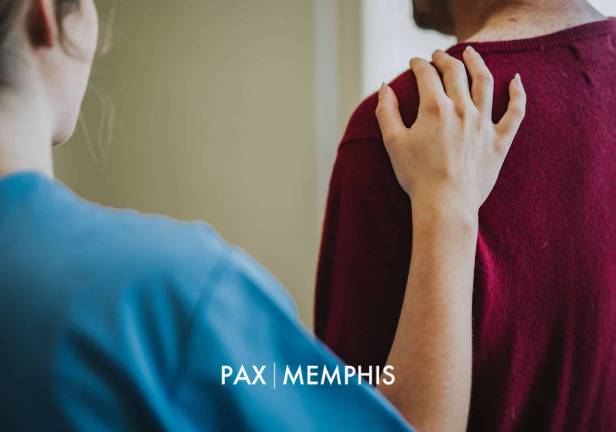Challenging the I = Addict Mentality:

What makes Pax Memphis clinical philosophy different from traditional IOP programs?
Many traditional IOP programs focus mostly on general early recovery skills and 12 step concepts, such as the identification of relapse triggers, the development of a sober support system and treating symptoms of addiction that present in the here in now. While obviously at Pax Memphis we address all of these aspects of the recovery process, we go much deeper into the underpinnings of addiction. We don’t simply chase symptoms.
How do you get a patient to go deeper?
We specialize in a modality called Inner Child Therapy. Many of patients have underlying feelings of shame, inferiority, inadequacy and fear stemming from their childhoods that operate unconsciously and negatively impact their thoughts and behaviors as they progress through their adolescence and adult hood. While sometimes there is a trauma that is easily identified, often negative shame messages that were communicated from family members, friends, teachers that aren’t easily recalled are at play. Patients have relied upon the use of drugs and alcohol to cope with these feelings often with devastating consequences. The staff at Pax Memphis are experts at helping our patients identify, acknowledge, and work through these feelings. Our patients learn how to self soothe and from a certain extent, begin learning how to take care of their inner child that was hurt, for some 20 or 30 years prior.
Why are the therapy groups at Pax Memphis special?
Our patients begin to trust each other because they are taught how to challenge feelings of shame through talking about things with each other that they may not have spoken about. When a patient is able to talk about things that make them feel shame or afraid in front of others and learn that their peers often feel the same way and have similar experiences, the power of fear and shame are disarmed and patients begin to feel relieved. The patients look at each other and the group leaders as family. Most of our patients socialize with each other outside of group, attend 12 step meetings together, and serve as a major source of sober support. This isn’t common practice in an outpatient program where patients go back home and to their jobs when they leave group.

The statistics for success in substance abuse treatment are low. Why is that, and why do you think the IOP Program at Pax Memphis can help me stay sober?
Myself and the staff at Pax Memphis are trying to challenge the statistics every day. Many patients relapse chronically because of a combination of things: unsupportive living environments, chronic pain, untreated Mental Health Disorders like Anxiety and Depression and family enabling. During the past 13 years, after working with thousands of patients I’ve learned that many addicts struggle with what to do when they are not “sick” anymore. Addiction or the word addict has been the way that many of our patients identified themselves for many years.
The idea of setting expectations for their future successes or perceived fears of expectations that others might set for them creates fear, for many become overwhelming. I call this the I = Addict Mentality. At Pax Memphis, we provide a supportive environment where patients utilize each other to challenge the irrational fears that keep many addicts stuck and relapsing.
Tell me more about this I = Addict Mentality.
Many of our patients and addicts in general experience negative self-concept or negative thoughts about self. Often these irrational thoughts about themselves begin in childhood and stem from many different sources including childhood trauma, their experiences in school or in a dysfunctional family unit where there might be divorce, poor communication styles or addiction/mental health issues of one or both of their parents or siblings. Over time and development of addiction and the associated psycho-social consequences, these irrational beliefs about self such as “I’m not good enough”,” I can’t succeed at anything” or “ I don’t deserve to be happy” become exacerbated and wreak havoc on our patients.
Patients become fearful of setting and working towards personal goals, engage in procrastination and begin to embrace their identity as an addict, the presenting symptom in a dysfunctional family unit, or an inferior member of our society. Often for patients that chronically relapse, work in early recovery offers glimpses of positive changes in their ability to achieve goals and to change their identities in their family units. However due to hopefulness and excitement, family members and the addict themselves often set unrealistic time frames for tangible life changes and patients become overwhelmed with fear.
Patients unconsciously begin to ask themselves “can I really take care of myself?” what will the family members expect of me if I’m not “sick” anymore?”, do I really deserve this”?. Patients engage in self sabotaging behaviors including relapse to immediately halt any expectations that create fear. Unfortunately, for many of our patients this unhealthy relapse pattern has been reinforced by family members, who after a relapse, immediately try to rescue their loved ones via sending them to another treatment center, taking care of their loved one’s personal financial responsibilities and communicating that only reestablishing sobriety is important now.
Over time addicts learn that this pattern is an acceptable behavioral pattern, a definitive strategy of halting any adult personal responsibility that creates fear. Another unhealthy byproduct of this pattern is that patient’s negative self-concept and irrational feelings of inability to care for themselves without family intervention is reinforced. Thus, patients continue to remain in an unhealthy pattern of active addiction, external intervention, early recovery and relapse contributing to phenomenon in which the addict believes they cannot function without being in treatment or “treatment center recidivism”

How does Pax Memphis treat the I = Addict Mentality?
At Pax Memphis we challenge the I = Addict Mentality via the fostering of a safe environment in which patients are educated and held accountable to their unhealthy behavioral patterns. Patients are taught how to foster interdependent relationships, or mutually beneficial relationships with their peers in group. Development of trusting relationships between group members is fostered by authentic sharing of feelings without judgment. Patients are taught that feelings are neither right nor wrong, what patients do with these feelings either fosters growth or stagnation. Patients hold each other accountable to behaviors that foster growth via healthy “carefontation” and patients are receptive to feedback due to the intimacy of their relationships. Patients are taught how they can foster their own recovery and improved self-concept via setting realistic goals and expectations of self and setting appropriate boundaries with family members and friends. Patients are taught that at this point in their lives being in active addiction is an irrational choice, and if desperate for their lives to change, they can achieve goals. Patients are also taught that their addiction is just a component of their identity, but does not identify them as people via positive self-affirmation. Patients are taught how to assertively communicate to their family members that they no longer want to be enabled and “infantilized”, but trust in their own ability to make decisions and achieve personal life goals.
My family members continue to enable, rescue and still have addictive behaviors. What can I do to help?
Family members are a crucial component of the recovery process. Often the family members of those suffering from addiction accidentally reinforce the addition via engagement in enabling and rescuing behaviors. Addicts irrational fears of inferiority or “not good enough” can be reinforced when family members take ownership for their loved one’s personal responsibilities. Though obviously enabling behaviors are fostered from love and with the best intentions, the addict interprets the behavior as proof of their incapability.
At Pax Memphis, we teach both addicts and their families how to establish a mutually beneficial relationship. Patients and family members are taught in family sessions how to break the cycle of “the addict takes and the “family gives” and instead fosters a relationship where both the family unit and the addicted/recovering member give and receive from each other. This is achieved by our therapists helping the family to identify unhealthy behavioral patterns and engaging in reality testing to help the members identify how the current family interplay is creating negative feelings, fostering resentment and not conducive to recovery.